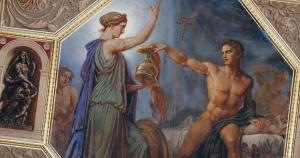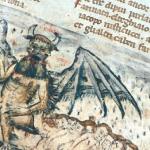I asked for new voices and got some outstanding writers! Today we hear from the erudite James R. Harrington.
 James R. Harrington earned his M.A. in Ancient History at California State University Fulleron and is a member of the Torrey Honors Institute. James has been a classical educator in a variety of settings over the past thirteen years. He lives in Houston with his wife, Sharon, and their daughter.
James R. Harrington earned his M.A. in Ancient History at California State University Fulleron and is a member of the Torrey Honors Institute. James has been a classical educator in a variety of settings over the past thirteen years. He lives in Houston with his wife, Sharon, and their daughter.
Mr. Harrington responded to thoughts on his first post.
Harrington wrote about the shield of Herakles,
He continued to the shield of Aeneas and followed up on that post. We turned to a shield in Ovid.
Now we begin with Quintus…
By the 4th Century A.D., the Roman Empire was a changed place. The wealthy and well-ordered Hellenistic East was back in control with a new capital at Constantinople and a new Eastern state religion: Christianity. Greek learning was still going strong, revived a century earlier by a movement known as the Second Sophistic. In keeping with the Hellenic spirit of the age, a writer known only as Quintus of Smyrna tried his hand at reviving the epic tradition by writing a learned sequel to Homer, Posthomerica. Following earlier writers like Sophocles and Ovid, Quintus also imagines the contest between Aias and Odysseus for the Shield of Achilles. Unlike Ovid, however, Quintus not only dares to describe the storied shield, but also to add a few telling touches of his own.
It takes either great heart or great hubris to try and better Homer. As we expect, Quintus’ shield fails to beat Homer on an artistic level, but one of Quintus’ changes shows that he may have been more interested in portraying what he thought was a better world-picture:
There was also fashioned on this work of art made by a god the very steep rugged
mountain of holy Virtue. She herself stood upon it, her feet set on top of a palm
tree. She was very tall, reaching up to heaven. Around her everywhere trails,
interrupted by numerous crags, kept men away from the noble path, because many
drew back, frightened by the steep approaches, and only a few, with much sweat,
were moving up the sacred way.*
This image of virtue seems to belong more to the world of Pilgrim’s Progress than to the mud and blood of the Iliad. Homer knows much about virtue (arête as he called it), if one means being the best at something; say racing (Achilles) or plotting (Odysseus). In the thousand years between Homer and Quintus, however, virtue (Latin virtus, or “manliness”) had developed a decisively moral connotation. By placing the quest for Virtue upon the shield, Quintus shifts the symbolic meaning of the object. No longer is Achilles’ Shield a depiction of a world formed and sustained by the never-ending conflict of opposites. It is instead a symbol of human aspiration for moral perfection. Moreover, in contrast to Homer’s depiction of communities as humanity’s basic unit, Quintus’ mountain of virtue places the emphasis on individual effort, and few indeed find the way!
Quintus of Smyrna’s version of the Shield of Achilles reminds us that the Ancients had their own ancient literature. Though members of the Mediterranean world made use of the same stories and symbols for over a thousand years, the meanings they attributed to them and the additions they made reflect seismic changes in the way the cosmos was understood as times and cultures changed. The Christian dukes and counts (from Latin dux and comte) of the Middle Ages, the descendants of Diocletian’s reorganized Roman army, would go on to bear the virtues of their own universe upon their shields while their scops, scalds, and troubadours recast Achilles, Herakles, and Aeneas as models of Chivalry. A shield, carried before a warrior into battle, is a powerful testament to why that person fights. While the era of carrying shields into battle is behind us, the power of the shield as a symbol remains, from university crests to anti-virus software, reflecting our values back to us.
*The War at Troy: What Homer Didn’t Tell, Quintus of Smyrna, Fredrick M. Combellack trans., New York: Barnes and Noble, 1996. pp. 106-107.













